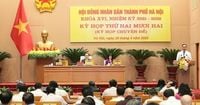On April 29, 2025, the Hanoi People's Council convened for a significant session, where it unanimously approved a resolution to rearrange the city's administrative units at the commune level. This decision, which saw 100% of the delegates in favor, will reduce the number of commune-level administrative units from 526 to 126, effectively streamlining local governance and enhancing administrative efficiency.
The rearrangement plan has garnered overwhelming public support, with over 2 million votes in favor, equating to more than 97% approval from the electorate. Additionally, nearly 2 million votes were cast in agreement with the proposed names for the new administrative units, achieving a remarkable 96% consensus. Notably, 38 communes received unanimous support for their new names. However, there remains a minority of 2.41% of voters who expressed disagreement with the naming plan, particularly in districts such as Dan Phuong, Hoai Duc, My Duc, and Thanh Tri, where approval rates fell between 82% and 93%.
During the session, Dinh Truong Tho, Secretary of the Dong Da District, articulated the rationale behind the restructuring, stating that the reduction to 126 units is aligned with the current realities of Hanoi and complies with directives from the Central Government. He emphasized that this restructuring not only addresses the overlaps between districts and communes but also enhances governance by ensuring that local leaders remain closely connected to the communities they serve.
To facilitate the transition, Tho called for the city to provide clear guidelines on managing personnel, including the arrangement of leadership roles and the integration of civil servants and public employees. He also highlighted the importance of maintaining the city's public administrative service centers and proposed that these should not be duplicated at the commune level to prevent inefficiencies.
The restructuring will see the establishment of new administrative frameworks at the commune level, where each unit will consist of four specialized departments: the Office of the People's Council and People's Committee; the Department of Economics (for communes) or the Department of Economics, Infrastructure, and Urban Areas (for wards); the Department of Culture and Society; and the Public Administrative Service Center.
Furthermore, the meeting discussed the need for a fair and efficient allocation of public officials. Tho noted that two Vice Chairpersons would hold dual roles: one as the Chief of the Office of the People's Council and the other as the Director of the Public Administrative Service Center. He recommended against this dual-role structure to ensure effective governance.
Le Minh Duc, Secretary of Thach That District, echoed Tho's sentiments, supporting the proposed model for Vice Chairpersons and emphasizing the necessity for a focused approach to administrative management in light of the upcoming changes.
Earlier, on April 28, the Hanoi Party Committee had convened to discuss the administrative restructuring plan, which is part of broader efforts to modernize the city's governance framework. The committee's discussions highlighted the need for an efficient, streamlined local government structure that aligns with national policies and better serves the population.
Hanoi's administrative overhaul aims not only to reduce the number of administrative units but also to ensure that the new structure is responsive to the needs of its citizens. The city plans to maintain the integrity of local governance while enhancing service delivery and operational efficiency.
As part of the transition, the Hanoi People's Council will also consider various resolutions related to public investment, land management, and environmental policies. These measures are designed to address pressing urban issues and improve the quality of life for residents across the city.
In summary, the restructuring of Hanoi's administrative units marks a significant step towards modernizing governance in the capital. With strong public support and a clear plan for implementation, the city is poised to enhance its administrative efficiency and strengthen its connection with the community.




